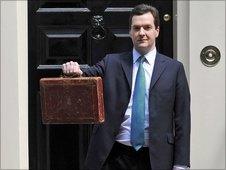Osborne defends independence of the OBR
- Published

Mr Osborne stressed that the OBR sets its own forecasts
Chancellor George Osborne has defended the independence of the Office for Budgetary Responsibility (OBR) amid reports it revised down a key forecast.
The Financial Times reported that the new body had reduced the number of public sector jobs that would be lost under the new government.
Former Chancellor Alistair Darling said the credibility of the OBR was now at stake.
But Mr Osborne said the body he created was separate from the government.
"The OBR sets its own forecasts," he said. "And that is completely different from the situation which existed under the previous government where the Chancellor of the Exchequer decided what the forecasts were and was often influenced as much by politics as economics.
"So by putting the OBR into existence, creating an independent body gives the public reassurance."
The FT said that a number of revisions the OBR had made reduced the number of public sector jobs that would be lost under the new coalition government by about 175,000 to an estimated 600,000 by 2015-16.
Βι¶ΉΤΌΕΔ economics editor Stephanie Flanders said some of the changes to the forecast were based on explicit government policies announced in the Budget, such as the two-year wage freeze for most public sector workers.
But other changes represented what the OBR believed to be more "plausible" assumptions about what would happen in the future which went beyond the new government's official policies, she said.
'Strangling a good idea'
Prime Minister David Cameron told the House of Commons last week that the latest OBR forecasts showed that 490,000 public sector jobs would be lost by 2014-15, and an estimated 610,000 by the following year.
Under the old Labour government's policies, the OBR forecast that job losses would have been almost as great - around 460,000 - despite the fact that the emergency Budget had instituted faster and deeper cuts in public spending.
As Stephanie Flanders explains, that release had already raised eyebrows, since it permitted the PM to steal a march on the opposition in that day's Prime Minister's Questions.
"Now we know that the two figures were calculated on the basis of different assumptions about the pace of public-sector wage growth and the future cost of public sector pensions," our economics editor said.
Responding to the latest claims, shadow chancellor Alistair Darling said: "It's clear from the revised figures that the public sector job losses will be 175,000 greater than the prime minister claimed last week.
"Right from the start the Tories used the OBR not just as part of the government but as part of the Conservative Party," Mr Darling said.
"They have succeeded in strangling what could have been a good idea at its birth."
A spokesman for the OBR said: "The OBR's best estimate of the aggregate impact of public spending reductions on public sector jobs was set out in our Budget forecast published last week.
"As stated alongside that forecast, changes from the pre-Budget forecast [based on Labour policies] reflected changes to modelling assumptions and Government policy."
- Published6 July 2010
- Published30 June 2010
- Published9 June 2010